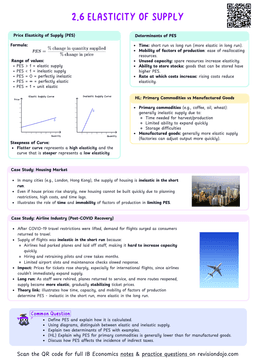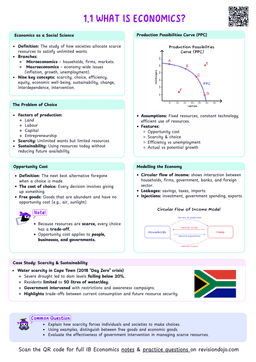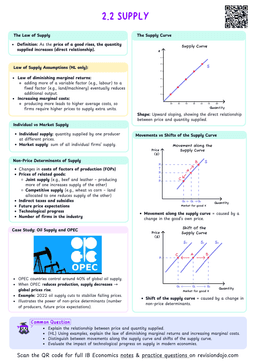Equity
The condition of being fair and just.
- In an income context, equity refers to fairness or justice in income distribution, while equality refers to everyone receiving the same income.
- In most societies, equity is interpreted as reducing extreme inequalities in income and wealth, as significant disparities are often perceived as unfair.
- However, the free market often fails to ensure equity.
How the free market causes inequalities
NoteRemember, in a free market economy, the allocation of resources is determined by market forces, supply and demand, with minimal government intervention.
While the free market system promotes efficiency and innovation, it can result in significant inequalities in income and wealth. This is due to several factors:
- Resource ownership:
- In a free market economy, individuals' income depends on the factors of production (land, labor, capital, and entrepreneurship) they own and can sell in resource markets.
- While everyone can provide an equal amount of labour, only a few tend to own the majority of land, capital, and entrepreneurship.
- Therefore, those who own more or higher-value resources tend to earn considerably more income (wages, rent, interest, and profits), creating income disparities.
- Limited access to resources:
- Owning some factors of production require large amounts of initial income, and therefore a large part of the population is unable to access them. This difficulty to access high-income-earning resources limits the income-earning potential of many.
- Additionally, some individuals, such as the elderly or disabled, may lack access to resource markets or earn low wages, further exacerbating inequalities.
- Wealth inequality:
- Wealth (assets like property, stocks, or savings) is often distributed even more unequally than income.
- High-income individuals save and accumulate wealth, whereas low-income individuals may struggle to save at all.
Circular flow of income to illustrate why the free market results in inequalities
Circular flow of income
An income flow in an economy where the value of the output produced is equivalent the total income earned from its production, which is also equivalent to the expenditures spent on purchasing that output.
- The circular flow of income model shows how income flows between households and firms.
- The model also highlights the root causes of income inequality in free-market systems due to disparities in resource ownership and factor prices (rent, wages, interests, profits).
Figure 1 above, the circular flow of income model, illustrates the inequitable income distribution in an economy:
- Households and resource markets
- Households supply factors of production (land, labor, capital, and entrepreneurship) to firms through resource markets.
- In return, they earn incomes in the form of wages, rent, interest, and profits.
- Households with more or higher-value resources (skilled labour, large capital holdings, or unique entrepreneurship talents) earn higher incomes.
- Firms and product markets
- Firms use these factors of production to produce goods and services, which they sell to households in product markets.
- The income households earn in resource markets determines their ability to purchase goods and services in product markets.
- Therefore, unequal ownership of resources leads to disparities in income distribution:
- Wealthier households have greater purchasing power and access to goods and services.
- Poorer households may struggle to meet basic needs.
To what extent is the concept of "fairness" in income distribution influenced by cultural and societal values? How might these perceptions vary across different economic systems?


